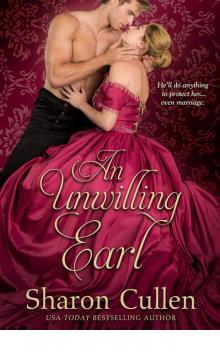- Home
- Sharon Cullen
His Saving Grace
His Saving Grace Read online
His Saving Grace is a work of fiction. Names, places, and incidents either are products of the author’s imagination or are used fictitiously. Any resemblance to actual events, locales, or persons, living or dead, is entirely coincidental.
A Loveswept eBook Original
Copyright © 2014 by Sharon Cullen
Excerpt from A Touch of Passion by Bronwen Evans copyright © 2014 by Bronwen Evans
All rights reserved.
Published in the United States of America by Loveswept, an imprint of Random House, a division of Random House LLC, a Penguin Random House Company, New York.
LOVESWEPT is a registered trademark and the LOVESWEPT colophon is a trademark of Random House LLC.
eBook ISBN 9780553391572
Cover design: Carrie Devine/Seductive Designs
Cover photograph: Hot Damn Stock
This book contains an excerpt from the forthcoming book A Touch of Passion by Bronwen Evans. This excerpt has been set for this edition only and may not reflect the final content of the forthcoming edition.
www.readloveswept.com
v4.0
ep
Contents
Cover
Title Page
Copyright
Chapter One
Chapter Two
Chapter Three
Chapter Four
Chapter Five
Chapter Six
Chapter Seven
Chapter Eight
Chapter Nine
Chapter Ten
Chapter Eleven
Chapter Twelve
Chapter Thirteen
Chapter Fourteen
Chapter Fifteen
Chapter Sixteen
Chapter Seventeen
Chapter Eighteen
Chapter Nineteen
Chapter Twenty
Chapter Twenty-One
Chapter Twenty-Two
Chapter Twenty-Three
Chapter Twenty-Four
Chapter Twenty-Five
Chapter Twenty-Six
Chapter Twenty-Seven
Chapter Twenty-Eight
Chapter Twenty-Nine
Chapter Thirty
Chapter Thirty-One
Epilogue
Dedication
By Sharon Cullen
About the Author
The Editor’s Corner
Excerpt from A Touch of Passion
Chapter One
ENGLAND, 1855
Lady Grace Ashworth, the dowager countess of Blackbourne, ascended the steps of Blackbourne Manor.
She lifted the doorknocker and let it fall, proud that her hands did not tremble too awfully much. She waited several moments before the door was opened by a dear, familiar face that she hadn’t seen in nearly a year. Despite her trepidation and trembling, she couldn’t help but grin. “Alfred, it’s so good to see you.”
The old butler’s lips twitched in what she knew was his way of smiling. “Likewise, my lady.”
She stepped in and handed her parasol to Alfred. “As I’m sure you know, I have an appointment with the earl.” She’d practiced saying the words all the way here just so she wouldn’t choke on them.
“This way, my lady.” With his back straight, Alfred shuffled past the grand soaring staircase that she knew led to the earl and countess’s private chambers, and down the hall toward the study. Against her better judgment and the firm lecture she’d given herself, she surreptitiously glanced around and was surprised to see that very little had changed since she had been removed from the house. She’d been so certain that the new countess would have overhauled the entire manor, putting her own stamp on the stately home. Grace had been saddened to think of the lovely wainscoting gone, replaced with something garishly new. Alas, none of that had happened. At least not in the public rooms. She very much doubted she would be invited to view the private rooms.
Alfred shuffled to a stop and pushed open the door to the study, stepping back to let her in. “His lordship will be with you shortly.”
“Thank you, Alfred.” She settled into the chair opposite the current earl of Blackbourne’s desk.
“My lady?” Alfred moved farther into the room after a quick glance down the hall. “The cook wanted me to tell you that you are missed.” He leaned forward to whisper, “The entire staff wanted me to convey that as well.”
Grace smiled through an unexpected stab of sorrow. She missed these people so much. “Thank you, Alfred. They are well?”
“Best as can be expected.”
“And Cook’s rheumatism? How is that faring?”
Alfred shook his head. “She’s in pain most of the time, I’m afraid. Not enough time in the day to put one’s feet up.”
Her smile faded. “No, I suppose not.” Did Clara, the current countess, know of Cook’s arthritis? Did she allow Cook time to put her feet up? From Alfred’s expression, Grace guessed not.
“Her ladyship—” Alfred’s back snapped taut, and he closed his mouth.
Nigel Ashworth, the earl of Blackbourne, also known as Grace’s brother-in-law, entered with a wave of his hand. “That is all, Alfred.”
The butler stepped into the hall and quietly closed the door, but not without a final sympathetic look at Grace that set her heart to thundering once again.
“Grace.” Nigel sank into the desk chair with a loud sigh. He wasn’t an ugly man, but Grace’s opinion of him colored her perception. He was ugly within, and for her, that tainted the outside. Though he had the black hair and green eyes of the Ashworths, unfortunately, Nigel had not inherited the regal bearing of his brothers. Nor the common sense. Or, for that matter, the business acumen. He was the youngest of three and had not been raised to take on the earldom, although one had to admit, he had done so with enthusiasm. He definitely enjoyed the prestige, if the rumors Grace had heard were true.
“So.” He folded his hands on his desk and looked at her. He was the shortest of the Ashworth brothers, and since his ascension to the earldom, he’d gained some weight that made him appear paunchy and fleshy.
But the eyes. It hurt to look into his eyes. They reminded her of Michael.
“I have heard that you and Sir Clayton Timmons have been spending some time together,” he said.
The tremors Grace had managed to quell returned tenfold. When she had been summoned to the manor house, she’d had no idea why. Out of the dozens of scenarios she’d considered, this was not one of them. “We’ve taken a few strolls through town, and he’s called to convey his condolences. Nothing serious, I assure you.”
“I had the opportunity to speak to Sir Timmons just yesterday. He is quite fond of you.”
Grace found it hard to catch her breath, unsure where this conversation was heading but knowing it wasn’t going to end well. None of her conversations with Nigel ended well. “He told you this?”
“But of course.” Nigel sounded entirely delighted. “He has offered for your hand.”
Grace blinked, her power of speech deserting her. Offered for her hand? As in marriage?
She curled her fingers into her palm and concentrated on breathing, on not showing her distress, and on digesting this shocking bit of news. When Sir Timmons first called on her, it had been to express his condolences upon learning of Michael’s death. He’d walked with her once or twice after her committee meetings, and she’d found it easy to talk to him. He was a good listener, quiet, unassuming, and a calming presence. Never had she imagined that their innocent friendship would lead to a marriage proposal.
“Of course I accepted on your behalf,” Nigel said.
Grace took a few moments to breathe deeply and form her thoughts. Don’t panic. Keep calm. Speak rationally. “That is very kind of Sir Timmons to offer, and of course, I a
ppreciate that you have nothing but the best intentions toward my welfare.” She was proud that she didn’t choke on those false words. Nigel had never given a second thought to her welfare. “But I do not wish to remarry.”
Nigel looked at her with pity. “You cannot possibly live the rest of your life as the dowager countess of Blackbourne. You are far too young to molder away in the dower house. Eventually you will want to find someone to spend the rest of your life with. Sir Clayton Timmons is an excellent match.”
She had to grit her teeth and count to three before speaking. First of all, she hated the term “dowager.” It implied that she was old, and while there certainly were times when she felt old, Nigel was correct: She wasn’t too far gone. Second, the term reminded her that Michael was dead, and that thought always brought with it a fresh wave of grief. Third, she knew Nigel would like nothing more than to pawn her off on Sir Timmons. If not Timmons, then the next poor sap who came along, because Nigel was the definition of greedy, and it ate at him that he had to pay her a third of the estate’s income, as befitting her dowager status.
“I have no intention of living the rest of my life with someone else, Nigel, and every intention of remaining the dowager countess of Blackbourne.”
His eyes narrowed, and two dark spots of color tinged his cheeks. “I believe you’ve mistaken the purpose of this meeting, Grace. I did not call you here to ask your opinion. I’ve called you here to tell you that I’ve already accepted Sir Timmons’s proposal on your behalf.”
For so long Grace had lived in a vacuum of nearly debilitating grief that to feel such intense anger was surprising and somewhat welcoming. “It’s only been ten months since Michael’s death.”
“While it isn’t done often, it is entirely acceptable for a widow to marry after ten months. Besides, Michael left for war over thirteen months ago. We are all quite certain that there is no issue from your marriage to my brother.”
No issue from your marriage. No, there was no issue. No child to pass the earldom on to from Michael, and wasn’t Nigel pleased about that.
“However…” Here Nigel appeared pained. “Timmons expressed the same sentiment and insisted that we wait out the remaining two months. The first of the banns will be read in three weeks. Three weeks after the last bann is read, you will be wed. That puts your mourning at exactly one year.”
Well. It seemed they had it all planned out. And what about her feelings? Why hadn’t she been consulted? Her anger stretched to encompass Sir Timmons. He should have discussed it with her before going to Nigel.
“My lord,” she implored, “I need more time.” She hated having to lower herself to pleading. For nearly ten months, she’d stayed away from Blackbourne Manor and the new earl and countess. As soon as the news of Michael’s death had reached Nigel, he’d wasted no time in traveling to the family seat and moving into the manor house, hustling Grace to the dower house, not even waiting for the servants to air it out and make it presentable.
Grace struggled for breath. Her fingers had become numb from clutching them so hard.
“Timmons will make an excellent husband and will see to all of your needs,” Nigel said. “His status as a new baron is quite proper, as well as his annual income from his investments.”
Grace couldn’t care less about Timmons’s income. What bothered her was that she was being pushed off on a man for whom she held no feelings other than mild friendship. And that she would spend the rest of her life living with one man while mourning another.
—
“It’s a disgrace, I say.” Ida Fisher, Grace’s lady’s maid, cook, housekeeper, and companion all rolled into one, followed Grace around the sitting room of the dower house, her anger taking up all the air. Grace couldn’t blame Ida; she was just as furious. But really, she wished Ida would stop her indignation for just a moment so Grace could think in peace.
“There’s nothing to be done, then?” Ida asked. “Nothing?”
“I don’t believe so. Nigel has everything tied up in a neat bow, right down to the reading of the banns and the date of the wedding.”
Ida harrumphed. “I don’t like this. You have no family to turn to, and he knows that.”
Grace didn’t like it, either. Ida was right. Grace had no family to turn to, since both her parents had died in an influenza epidemic four years ago. She’d had only Michael for family.
“Seems the least he could do was let a lady decide her own wedding date,” Ida said.
Yes, it seemed.
“So what are you to do?” Ida picked up an antimacassar from the back of a chair to twist the lace.
Grace gently took the mutilated lace and smoothed it back into place on the chair. “What am I going to do? I’m going to attend the festival committee meeting, like I had been planning, that’s what I’m going to do.”
“But my lady, how can you even think of festivals at a time like this?”
“Because, Ida, I can’t think of Nigel or marriage or anything else right now.” Because going to the festival planning committee was the most she could do at the moment without falling apart. And she knew if she stayed within these walls and thought about what had happened up at the manor house, she would fall apart.
So she gathered her parasol, adjusted her hat in the mirror, and set off for Prudence Davison’s home. Prudence was the chair of the festival committee and the wife of the local solicitor, a very nice woman who managed to pull together the festival every year with her long lists and her ability to corral everyone together and browbeat those who tended toward laziness. No one dared to take her place; neither did anyone want the position of committee chair; so everyone deferred to Prudence and was happy to do so.
Grace had her driver and all-around handyman, George—also known as Ida’s husband—drop her off a few blocks from Mrs. Davison’s home, situated just off the main street. Grace enjoyed the exercise and nodded to the people she knew as she passed them. Hadley Springs wasn’t London, and that had been just fine with her and Michael. William, Michael’s older brother and the earl at the time, had allowed them the use of Blackbourne Manor because he preferred the excitement of London, while Grace and Michael were much more suited to country living. The arrangement had been simple and convenient for all parties involved. When he’d been home from his duties as an officer in the First Royal Dragoons, Michael would see to the vast expanse of lands and the income Blackbourne Manor generated, and William would see to all the other estates and investments.
The memories of Michael were sharp today and her grief fresh. Some days she missed Michael so much it took everything she had to get through the day. There were still moments when she made mental notes of things to tell him before she remembered that he would never walk through the front door again or laugh at a funny story she’d told.
The other committee members were already there when Grace arrived. She pasted on a smile and shored up her defenses—something she’d become somewhat of an expert at since she was widowed.
Prudence was pouring tea, and everyone was talking to one another before the serious business of planning the festival commenced. Grace sat next to her best friend, Lady Sara Emerson. Lady Sara was the daughter of the marquess of Grandview, a quiet person but reliable: hence the reason she was a committee member. Sara would accomplish any task given to her, even the menial ones, without a word of protest. Grace and Sara had become fast friends when Grace moved to Hadley Springs after her marriage to Michael. Sara tended to disappear into the shadows, especially during social situations, but once Grace had broken through Sara’s shyness, she’d discovered a gem in the soft-spoken woman.
Sara smiled at Grace and moved to make room for her on the settee, but as soon as Grace sat, Sara’s smile faltered. “What is wrong?” she whispered in her soft way.
Grace shook her head, not wanting to get into the story here, where many ears were listening even though they pretended not to be. Sara’s concerned gaze took in Grace’s.
“Not now,” Grace m
urmured, then smiled up at Violet, Prudence’s daughter, as the girl handed Grace her tea.
Just as Prudence was about to start the meeting, Clara Ashworth, the current countess of Blackbourne, swept in and Grace’s heart sank. Of course Clara would be here. She would not miss this opportunity to gloat and spread the news that Grace was to marry.
Clara’s attendance at the church meetings were sporadic. Usually, she attended only when she had some important piece of gossip or when she felt in a particularly gloating mood. Today would fulfill both of those intents.
The other women tittered, for it was a coup to have the countess at their humble meetings. Never mind that Grace, the dower countess, attended every meeting. Moods shifted. Alliances came and went. She understood that. What she didn’t understand was why these women simpered over the likes of Clara. She was sometimes cruel, often insensitive, and always self-involved.
“I apologize for my tardiness,” Clara said breathlessly as she settled on the other settee. After she made two women move.
She was a pretty woman with light brown hair and dark brown eyes. She was short but round in all the right places. She came from money but not nobility. Her father was a merchant, having earned his wealth in shipping and textiles. She had been thrilled at Michael’s death, for it elevated her to the lofty title of countess. And like her husband, she took to the title with relish and vehemence and never for a moment let anyone forget who she was. For the most part, Grace had little to do with her except for her periodic appearances at their biweekly festival meetings, in which Grace suffered Clara’s superiority in silence and with a smile.
“I know the meeting is about to be under way,” Clara said. “But I just have to ask if the dowager countess told you her wonderful news.”

 Bound to a Spy
Bound to a Spy Deceiving an Earl
Deceiving an Earl The Notorious Lady Anne: A Loveswept Historical Romance
The Notorious Lady Anne: A Loveswept Historical Romance Wherever You Are
Wherever You Are Wed to a Spy
Wed to a Spy Night Song
Night Song MacLean's Passion: A Highland Pride Novel
MacLean's Passion: A Highland Pride Novel Obsession: A Love on the Edge romance
Obsession: A Love on the Edge romance An Unwilling Earl
An Unwilling Earl His Saving Grace
His Saving Grace Sebastian's Lady Spy
Sebastian's Lady Spy Her Dark Knight
Her Dark Knight Campbell's Redemption
Campbell's Redemption The Reluctant Duchess
The Reluctant Duchess